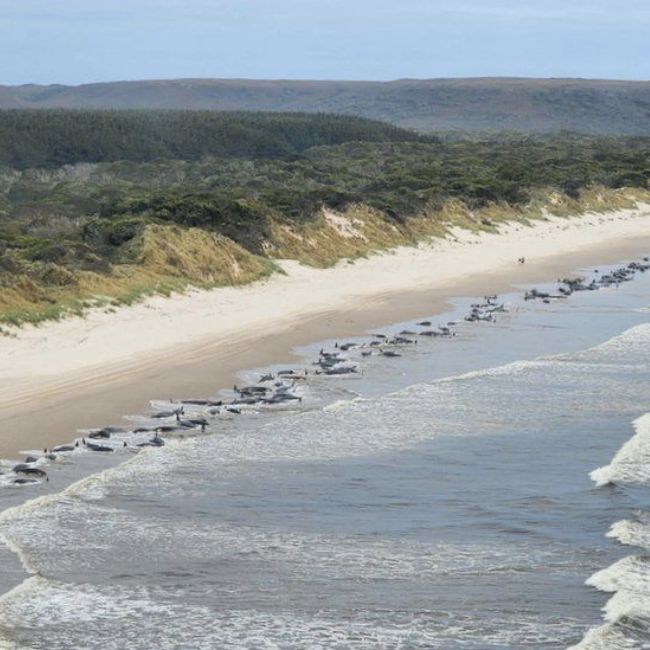
200 whales are stranded on Australian beach!
Recommended for Preparatory Grades
Something sad and worrisome has happened in Tasmania, Australia. More than 200 pilot whales, which are a type of large marine animal, have become stranded on a beach. People have noticed that about half of them are still alive.
Stranded Whales: Rescue Efforts
- The people who take care of the beach have started a mission to rescue the stranded whales. They don’t know why this happened, but it occurred at the entrance to a place called Macquarie Harbour.
- Pilot whales are very social creatures. They travel together in big groups and communicate with each other all the time. That’s why they are called pilot whales, as it is believed that they follow a leader in their group.
- Rescuing the stranded whales is not easy. The Department of Natural Resources and Environment of Tasmania is working on a plan to save them. The location of the stranded whales makes the rescue operation complex because the harbour is large and shallow, and it’s in a rural area.
- As time goes by, the authorities are worried that more of the whales may die. However, the people who live in the area are doing everything they can to help. They are pouring water from buckets and covering the whales with blankets, hoping to keep them alive.
- Marine conservation experts will try to help the healthier whales get back into the water so that they can survive. They believe that the whales may have made a mistake in their navigation. They might have followed a sick or confused leader, or they could have been scared and ended up in the shallow waters.
- It’s important to remember that incidents like this can be sad, but many people are working together to help these beautiful creatures. We hope that the rescue efforts will be successful and that the stranded whales can return to their natural habitat soon.
Similar Stories
Watch a video
Discover the captivating tale of the Pilot Whale, brought to you by the incredible Fair Earth Foundation!
Curious Times is a place where we’re passionate about what we do. Consequently, we work hard every day to give our young readers the most outstanding possible experience and information. We also use Curious Times Weekly, The Curious Magazine, and My Expressions to communicate with our audience. As a result, our content is exciting and interesting for our readers.
School children from all around the world appreciate and enjoy our materials. So, we’re always looking for ways to improve, and are curious to hear from you. This, above all, assists us in providing better service to you.
Thus, what sort of news stories capture your interest? In the comments section below? Please share your thoughts! For the simple reason that we enjoy hearing from our young readers. The following social media platforms allow you to communicate with us: WhatsApp, Instagram, Facebook, Youtube, Twitter, and LinkedIn.
1 (Please login to give a Curious Clap to your friend.)
